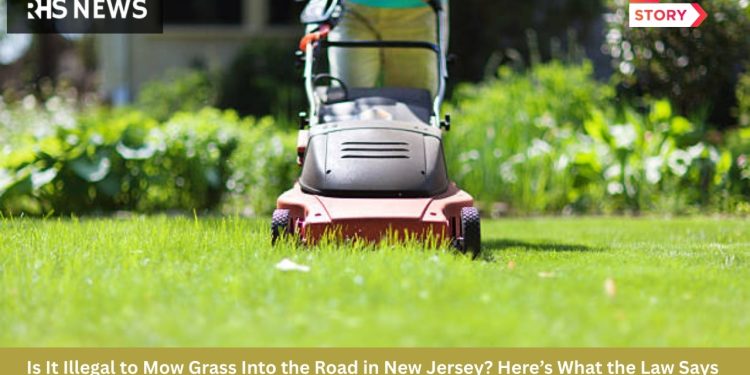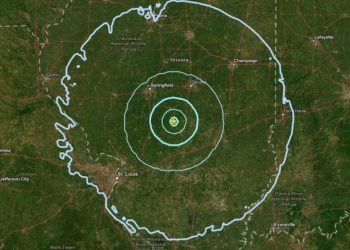Picture this: it’s a beautiful Saturday morning in New Jersey, and you’re tackling your lawn maintenance routine. As you push your mower along the edge of your property, grass clippings inevitably fly into the street. You might wonder whether this common practice could land you in legal trouble. The answer isn’t as straightforward as you might think, and understanding New Jersey’s regulations can save you from potential fines and safety hazards.
Lawn care practices that seem harmless can actually pose significant risks to public safety and violate state regulations. From motorcycle accidents caused by slippery grass clippings to storm drain blockages that lead to flooding, the consequences of improper lawn waste disposal extend far beyond aesthetic concerns. This comprehensive guide will explore the legal landscape surrounding grass clipping disposal in New Jersey, helping you navigate the rules while maintaining your property responsibly.
Understanding New Jersey’s Lawn Care Regulations
New Jersey takes environmental protection and public safety seriously, which is reflected in its comprehensive approach to lawn waste management. The state’s regulations encompass both environmental concerns and traffic safety considerations, creating a framework that property owners must navigate carefully.
The primary authority for lawn care regulations comes from the New Jersey Department of Environmental Protection (NJDEP), which oversees waste management practices throughout the state. These regulations are designed to protect waterways, prevent pollution, and maintain public safety on roadways. Additionally, local municipalities often have their own ordinances that may be stricter than state requirements.
Property owners in New Jersey are generally responsible for ensuring that their lawn care practices don’t create hazards or violate environmental regulations. This responsibility extends to how grass clippings and other yard waste are managed, particularly when they might affect public areas like roads, sidewalks, and storm drainage systems.
The Legal Framework: State Laws and Local Ordinances
New Jersey state law doesn’t explicitly prohibit mowing grass clippings into the road, but several related statutes create a complex legal environment that effectively makes this practice problematic. The key lies in understanding how various laws intersect to create liability for property owners.
In New Jersey, it is illegal to blow, rake, sweep, or otherwise deposit grass clippings onto the road. This isn’t just a matter of courtesy—local ordinances and state regulations class this as a violation, subject to fines or even a summons. The specific language varies by town, but the message is clear across municipalities: keep your yard waste in your yard, not on the street.
The state’s littering laws, codified under Title 39 of the New Jersey Statutes, define littering broadly to include any material that creates a hazard or unsightly condition on public property. While grass clippings might seem natural and harmless, they can fall under this definition when they create safety hazards or accumulate in problematic ways.
Environmental regulations under the New Jersey Pollutant Discharge Elimination System (NJPDES) also come into play. Grass clippings that wash into storm drains can contribute to water pollution, potentially violating clean water regulations. The state has been increasingly vigilant about non-point source pollution, which includes runoff from residential properties.
Local municipalities across New Jersey have implemented their own ordinances addressing grass clipping disposal. Many towns have specific rules prohibiting the discharge of yard waste onto public streets, sidewalks, or into storm drainage systems. These local laws often carry immediate enforcement mechanisms and can result in fines ranging from $50 to $500 for first-time offenses.
Why Is It Against the Law?
Blowing or mowing grass into the road isn’t just unsightly—it can pose real hazards:
-
Traffic Hazards: Wet grass clippings create a slippery surface, increasing the risk of accidents for cars, bicycles, and especially motorcycles.
-
Storm Drain Clogging: Grass clippings can clog storm drains, leading to localized flooding during heavy rains. This puts additional strain on municipal infrastructure and can cause property damage.
-
Environmental Impact: When grass clippings enter stormwater systems, they can contribute to water pollution as they decompose, releasing nutrients and potentially pesticides or herbicides into local waterways.
-
Public Health: Decaying grass in the roadway can attract pests and create unpleasant odors.
Municipalities like Linden, Ocean Township, Franklin Township, Denville, and others have explicit ordinances that state it is a violation to place yard waste, including grass clippings, on public streets unless the clippings are properly containerized for collection. Even professional landscapers can be cited for violations if they ignore these rules. Residents are strongly encouraged to direct clippings back onto their lawns, compost them, or place them in approved containers for pickup—never directly into the street.
Best Practices for Grass Clipping Management
Responsible lawn care practices can eliminate the legal and environmental concerns associated with grass clipping disposal while often improving lawn health. The most effective approach is to follow the “grasscycle” method, which involves leaving clippings on the lawn where they decompose naturally and provide nutrients to the soil.
Modern mulching mowers are specifically designed to chop grass clippings into small pieces that decompose quickly without creating thatch problems. This approach eliminates the need to dispose of clippings while providing natural fertilization that can reduce the need for chemical fertilizers by up to 25%.
When grasscycling isn’t practical due to excessive growth or wet conditions, collecting clippings for proper disposal becomes necessary. Most New Jersey municipalities offer yard waste collection programs that provide environmentally responsible disposal options. These programs typically operate on scheduled collection days and may require specific bagging or containerization methods.
Composting represents another excellent option for grass clipping disposal. When combined with other organic materials like leaves and kitchen scraps, grass clippings create valuable compost that can improve soil health and reduce waste going to landfills.
Enforcement and Penalties
Enforcement of grass clipping regulations in New Jersey typically occurs through municipal code enforcement officers, though state environmental agencies may become involved in cases involving water pollution. Most violations are initially addressed through warning notices, giving property owners an opportunity to correct the problem before facing financial penalties.
First-time violations often result in fines ranging from $50 to $200, depending on the municipality and severity of the violation. Repeat offenses can result in significantly higher penalties, with some communities imposing fines up to $1,000 for chronic violators. In extreme cases involving environmental damage, state agencies may pursue additional penalties under environmental protection statutes.
The enforcement process typically begins with a complaint from neighbors or observation by code enforcement officers. Property owners are usually given notice of the violation and a specified time period to correct the problem. Failure to comply within the given timeframe results in the imposition of fines and potential legal action.
Some municipalities have adopted progressive penalty structures that increase fines for repeat violations. This approach recognizes that some property owners may view modest fines as an acceptable cost of convenience, while escalating penalties encourage compliance.
Seasonal Considerations and Special Circumstances
New Jersey’s climate creates seasonal variations in grass growth that affect clipping management strategies. Spring growth spurts often result in excessive clippings that may be difficult to manage through grasscycling alone. During these periods, proper collection and disposal become particularly important.
Fall presents unique challenges as grass clippings mix with fallen leaves, creating larger volumes of yard waste. Many municipalities adjust their collection schedules during peak fall cleanup periods to accommodate increased volumes. Property owners should plan accordingly and may need to make multiple collections or consider alternative disposal methods.
Drought conditions, which have become more common in recent years, can create situations where grass clippings are particularly dry and more likely to blow into roads or neighboring properties. During these periods, extra care is needed to contain clippings and prevent them from becoming airborne.
Wet weather presents the opposite challenge, with soggy clippings more likely to clump together and create safety hazards on pavement. Timing lawn care activities to avoid wet conditions and using proper equipment can help minimize these issues.
Technology and Equipment Solutions
Modern lawn care technology offers numerous solutions for managing grass clippings responsibly. Mulching mowers have evolved significantly, with improved blade designs and deck configurations that create finer clippings that decompose more quickly. These mowers eliminate the need for clipping disposal in many situations.
Bagging attachments for mowers provide efficient collection when grasscycling isn’t appropriate. Modern bagging systems are designed to maximize capacity while maintaining mower performance. Some systems include features like compaction to increase bag capacity and reduce the frequency of emptying.
Side discharge mowers require more careful management to prevent clippings from reaching roadways. Deflector shields and discharge chutes can be adjusted to direct clippings away from sensitive areas. Some manufacturers offer retrofit kits that convert side discharge mowers to mulching configurations.
Electric and battery-powered mowers are becoming increasingly popular and often produce finer clippings that are easier to manage. These mowers tend to operate more quietly, allowing for more flexible mowing schedules that can help avoid wet conditions.
Community Education and Awareness Programs
Many New Jersey municipalities have developed educational programs to inform residents about proper yard waste management. These programs often include information about local ordinances, environmental impacts, and best practices for lawn care. Educational efforts typically increase compliance more effectively than enforcement alone.
Community workshops and demonstrations provide hands-on learning opportunities for residents. These events often feature equipment demonstrations, composting instruction, and information about local resources for yard waste disposal. Master Gardener programs frequently participate in these educational efforts.
Social media and municipal websites have become important platforms for sharing information about lawn care regulations and best practices. Many communities use these channels to provide reminders about collection schedules, seasonal tips, and updates about local ordinances.
Neighborhood associations and homeowners’ groups can play important roles in promoting responsible lawn care practices. Peer education and community pressure often prove more effective than regulatory enforcement in changing behavior patterns.
Economic Implications and Cost Considerations
The economic impact of improper grass clipping disposal extends beyond individual fines to include broader community costs. Municipal spending on street sweeping, storm drain maintenance, and water treatment facilities increases when yard waste enters public systems inappropriately.
Property values can be affected by neighborhood maintenance standards, including lawn care practices. Communities with well-maintained landscapes and responsible waste management practices typically maintain higher property values. Conversely, areas with chronic waste management problems may experience property value decline.
The cost of proper lawn care equipment and disposal services should be weighed against potential fines and liability risks. Investing in quality mulching equipment or participating in municipal collection programs often proves more economical than risking penalties and accidents.
Commercial landscaping services operating in New Jersey must factor compliance costs into their pricing structures. Professional services typically carry insurance and follow established protocols for waste disposal, which may justify higher service costs compared to informal lawn care providers.
Future Trends and Regulatory Evolution
New Jersey’s approach to lawn care regulation continues to evolve as environmental awareness increases and climate change impacts become more pronounced. Future regulations may become more stringent, particularly regarding water quality protection and stormwater management.
Climate change is expected to increase the frequency and intensity of precipitation events in New Jersey, making storm drain management even more critical. This trend may lead to enhanced enforcement of yard waste regulations and stricter penalties for violations.
Technological advances in lawn care equipment and waste processing may influence future regulatory approaches. As more efficient and environmentally friendly options become available, regulations may be updated to reflect new capabilities and expectations.
Regional coordination among New Jersey municipalities may increase as environmental challenges require broader approaches. Standardized regulations across larger geographic areas could simplify compliance for residents and improve overall effectiveness.
Conclusion
Understanding and complying with New Jersey’s lawn care regulations requires awareness of both state environmental laws and local municipal ordinances. While mowing grass clippings directly into the road may not be explicitly illegal under state law, the practice creates significant legal, safety, and environmental risks that property owners should carefully consider.
The key to responsible lawn care lies in adopting practices that protect both public safety and environmental quality while maintaining attractive landscapes. Modern equipment and techniques make it easier than ever to manage grass clippings responsibly without creating hazards or violating regulations.
Property owners who take proactive steps to understand local requirements and implement best practices will avoid potential legal issues while contributing to community safety and environmental protection. As regulations continue to evolve and enforcement becomes more sophisticated, responsible lawn care practices will become increasingly important for New Jersey homeowners.
The investment in proper equipment, education, and disposal methods represents a small cost compared to the potential risks of non-compliance. By staying informed about local regulations and adopting proven best practices, property owners can maintain beautiful lawns while being good neighbors and environmental stewards.









